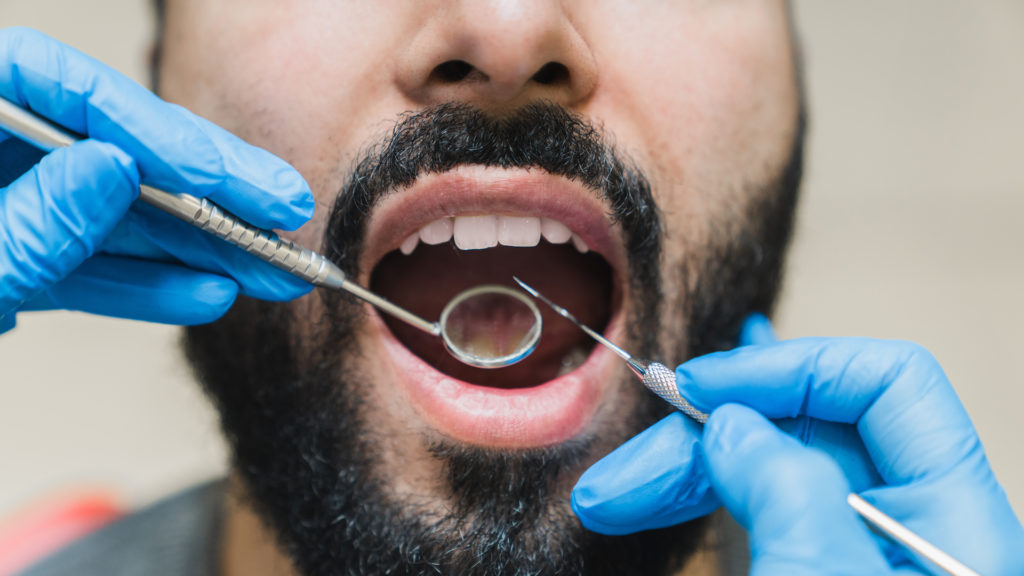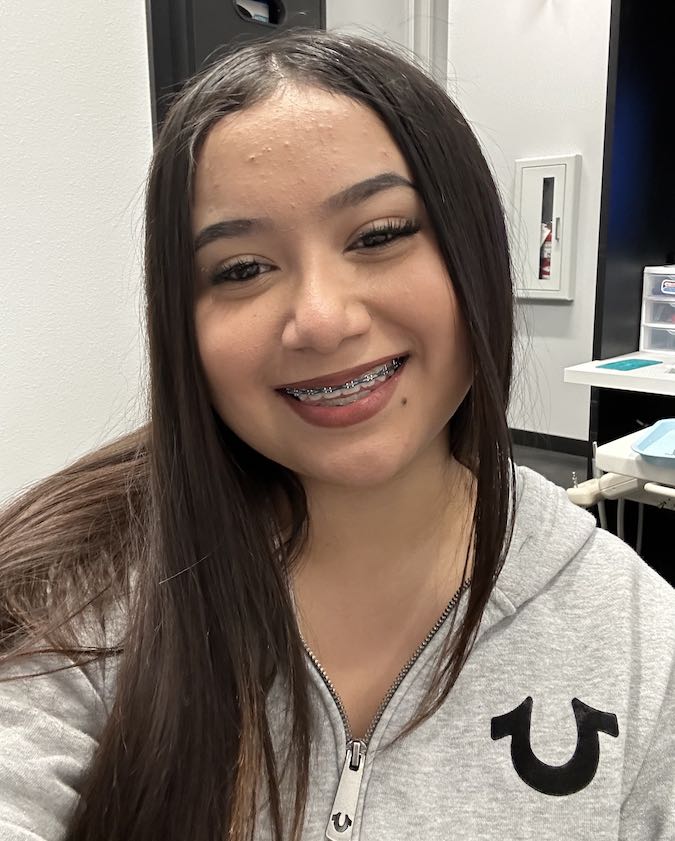While loose teeth in children occur naturally unless they're caused by an accident, a loose tooth in an adult often indicates a deeper issue that should be addressed as soon as possible. Gum disease, stress-induced tooth clenching, underlying medical conditions, and even medications can all contribute to loose teeth in adults.
If you've got a loose permanent tooth, it's important to schedule a dental checkup right away. A professional dentist can correctly diagnose the underlying cause and advise on the best treatment options to help prevent permanent tooth loss. We've also created this informative article to help you learn more about the common causes of loose teeth in adults and how dentists treat the condition.
What Does a Loose Tooth Feel Like?
A loose adult tooth feels similar to a loose baby tooth. When you touch the tooth with your tongue, it could feel wiggly or wobbly. You might also feel pressure or pain when biting down or brushing your teeth. Loose adult teeth can also cause inflamed, painful gums that bleed easily. If your loose tooth is caused by an impact injury, it might appear angled in the tooth socket or feel like it's turned around when you touch it with your finger or tongue.
What Causes Loose Teeth in Adults?
Loose teeth in adults have many different causes. In many cases, treating the underlying issues and practicing good oral hygiene can help tighten the teeth and prevent permanent tooth loss. Visiting your dentist at the first sign of a loose tooth or loose teeth is an important step in saving your smile! Here are some of the most common causes of loose teeth in adults.
Undiagnosed Gum Disease
Gingivitis is a type of gum disease that causes puffy, inflamed gums that may bleed when you brush or floss. Periodontitis is a severe form of gum disease that develops below the gum line when plaque hardens into tartar. In addition to inflamed or bleeding gums, periodontitis can also cause loose teeth. This is because the hardened tartar releases toxins that can break down the gum tissues and bone if the condition goes undiagnosed or untreated.
Changes in Bone Structure Due to Disease
Diabetes, hypertension, Crohn's disease, and rheumatoid arthritis are medical conditions that can increase your risk of developing periodontitis. Once periodontitis sets in, it can lead to bone loss in the jaw and changes in the jaw bone structure if left untreated.
Diabetes causes bone loss throughout the body, including the jaw, while immune disorders such as Crohn's disease and rheumatoid arthritis can lower your natural immunity and cause inflammation of the gums and oral tissues. People with hypertension or high blood pressure lose higher-than-normal amounts of calcium through their urine, which can lead to weakened bones and bone loss in the jaw.
Changes Due to Pregnancy
If you've ever heard the old wives' tale "gain a child, lose a tooth," it actually holds some truth! Studies show the natural hormonal fluctuations that occur in pregnancy can cause the gums to overreact to dental plaque and cause inflammation and bleeding.
The good news? Pregnancy gingivitis is usually temporary. With proper treatment, symptoms tend to clear up after the baby is born and the hormones reset. The not-so-good news? If left untreated, pregnancy gingivitis can increase your risk for periodontitis and loss of teeth. If you're pregnant or plan on becoming pregnant, it's important to talk to your dentist about your unique dental needs during this time.
Injury
Facial injuries caused by falls, accidents, and sudden impacts can cause tooth luxation, a condition in which the tooth becomes loose or angled in the socket. In addition to a loose tooth, symptoms of tooth luxation can include bleeding gums, tender gums, sensitive teeth, and localized tooth pain. The injured person might also hear a high-pitched sound when they tap on the tooth. If your tooth becomes loose due to an injury, it's important to schedule an emergency dental appointment as soon as possible.
Osteoporosis
Sometimes referred to as a "silent" disease because it doesn't usually cause symptoms until you break a bone, osteoporosis is a condition that causes decreased bone mass. Osteoporosis can develop at any age, but it's most common in older men and postmenopausal women. People with osteoporosis develop brittle bones that can easily fracture. When the jaw bones are weakened by osteoporosis, it can result in loose teeth and possible tooth loss.
Teeth Grinding
Bruxism, or teeth grinding, is a condition that causes people to grind their teeth during sleep or unconsciously when they're awake. The specific cause of teeth grinding and clenching isn't fully understood, but medical professionals believe that it may be linked to issues such as excessive stress, anxiety, and snoring. Smoking and caffeine intake may also trigger bruxism episodes. Over time, the constant pressure on the teeth and ligaments in the mouth can contribute to loose teeth, especially for people with existing dental conditions such as tooth decay or gum disease.
Medications
Medications don't directly cause loose teeth, but taking certain medicines may increase your risk for dental disease. When dental diseases go untreated, loose teeth and permanent tooth loss can occur. Antihistamines, antidepressants, blood pressure medications, and diuretics contain ingredients that can cause fluid loss and dry mouth symptoms. A dry mouth creates the perfect breeding ground for harmful bacteria to multiply, and bacteria contribute to gum disease and tooth decay.

Treatment Options for an Adult Loose Tooth
Treatment options for adult loose teeth include splinting, bite adjustment procedures, and deep cleaning and scaling.
Splinting is a procedure that's most often used on loose teeth caused by injuries. During a splinting procedure, the dentist bonds the loose tooth to its neighboring teeth with a metal splint. This helps stabilize the loose tooth as the surrounding tissues and ligaments heal.
Bite adjustment procedures are recommended for patients with loose teeth caused by teeth grinding and bruxism. When a dentist performs a bite adjustment procedure, they use a specialized tool to reshape the biting surface of the tooth. This greatly reduces the pressure caused by grinding and clenching and allows the loose tooth and ligaments to heal.
For patients with loose teeth due to periodontitis, deep cleaning, and root scaling procedures help remove tartar from below the gum line. The dentist uses a scaling tool to break up hardened tartar and calculus on the teeth and the tooth roots. Once the tartar is removed, the gums are allowed to heal and tighten, which can help reverse loose teeth.
Loose Tooth Prevention for Adults
While a loose tooth caused by an injury or accident can't always be prevented, taking proactive steps with your dental health may help prevent loose teeth due to dental disease. Here are some tips on how to prevent loose permanent teeth:
- Schedule regular dental visits. Scheduling regular dental visits that include checkups and cleanings is an important step in preventing tooth loss. Regular cleanings help keep your teeth and gums healthy by removing tartar buildup and plaque. Periodic checkups allow for early detection of issues, such as gingivitis and periodontal disease, that can contribute to loose teeth.
- Wear a mouthguard or splint. If you have bruxism or clench your teeth, your dentist may recommend wearing a mouthguard or splint when you sleep. These devices work by separating the teeth and providing a cushion when you grind or clench. This helps reduce pressure on your periodontal ligaments and may prevent loose teeth.
- Rinse with hydrating mouthwash. Rinsing with a hydrating mouthwash is a good way to reduce bacteria in your mouth and encourage saliva production, which can lower your risk of developing gum disease. If you suffer from dry mouth, be sure to use alcohol-free mouthwash as alcohol can increase dryness and irritate the gum tissues.
If you have symptoms of a loose tooth, Risas Dental can help. Our comprehensive dental services are affordable, and we offer payment plans and financing for all budget types, with no credit check required. We understand a loose tooth can be a little scary, even for adults, but there's no need to worry. At Risas Dental, we "speak patient" — our teammates will guide you through every step of your procedure and keep you informed at all times. Schedule an appointment today!
Frequently Asked Questions
While it's normal for children to have loose teeth, slightly loose permanent teeth usually indicate an underlying dental condition or injury. Loose teeth in adults should always be examined and treated by a professional dentist to prevent complications.
Hormonal changes that occur in pregnancy and during menstruation can sometimes cause temporary loose teeth. This is because the fluctuating hormones can loosen the ligaments that surround the teeth, and the gums retighten once the hormones balance out. Facial injuries, teeth grinding and gum infections can also cause temporary loose teeth.
Rinsing with saltwater can sometimes help soothe swollen gums and flush bacteria out of the mouth, but it can't tighten loose teeth that are caused by dental disease or injuries. If you have symptoms of a loose tooth, it's always best to contact your dentist immediately to ensure you receive the correct treatment.


